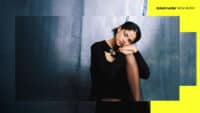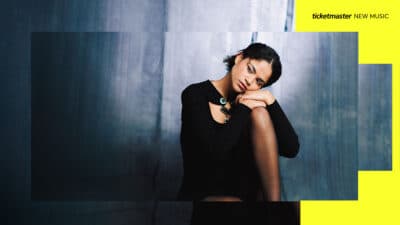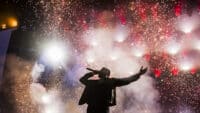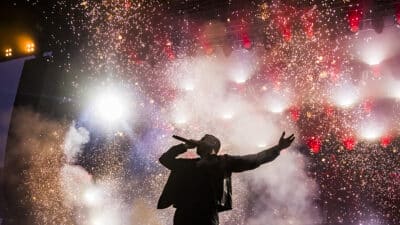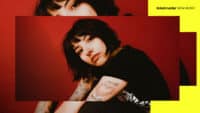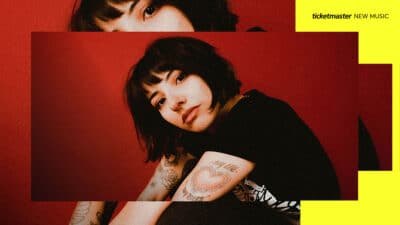Music
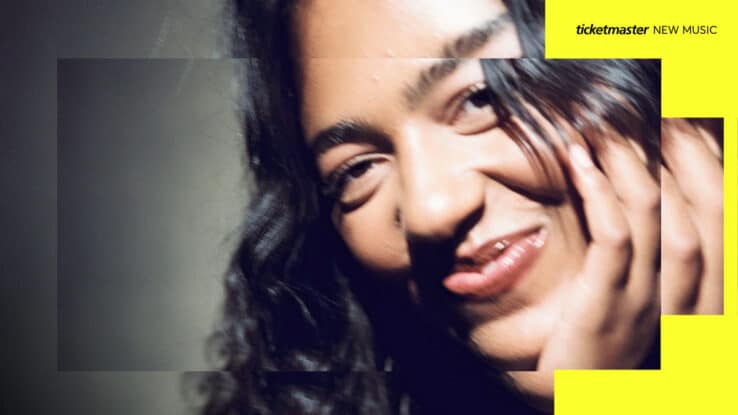
Interview
Hope Tala: “I feel freer to be who I am, no matter what shape that takes”
Our New Music artist of the month talks debut album, growing up and learning to go with her gut
Press play on Hope Handwritten, Hope Tala’s debut album, and you’ll instantly be swept away by waves of sunny, lilting serenades in indie, R&B and Bossa nova shades. Listen more closely, however, and you’ll see storm clouds gather as the London musician not-so-gently steps into adulthood through growing pains, heartbreak and losing faith, capturing the rush of a new romance on the light-headed, string-laced ‘Fall Too Hard’, or swaying along an intriguingly layered contemplation on slavery and her family roots on ‘Survival’. Through it all, hope, that most resilient of emotions, and Hope the person shine through, her open, honest lyricism adding fresh nuances on every turn.
Tala studied English literature and has talked about choosing music over a master’s degree at Cambridge University, releasing her first EPs Starry Ache and Sensitive Soul in the process, building on a songbook that bridges her classical music studies with her love of Shakespeare and romcoms.
A few days before her summer shows in the US, we meet via Zoom to talk about pulling from such different directions, having the strength to stand up for what feels right musically, and the spaces she feels most vulnerable. ‘I Can’t Even Cry’ is one of those moments of weakness and doubt. She got moved to tears when the audience started singing along at a recent London show: “That’s one where I’m really saying, ‘I don’t know what to do, I don’t feel hopeful, I hope that one day I will feel hopeful again but right now I don’t know how to express myself, I don’t know how to look forward to the future”.
But the sun is out again. She’s now working quite intently on her ‘more R&B-leaning’ sophomore album, with an EU and UK tour coming up this November.
Hope Handwritten was developed over a period of a few years. Would you like to talk a bit about the ups and downs you went through during this time and how they shaped the sound and themes on the album?
I definitely experienced ups and downs and just the turbulence of being in my 20s, for sure. Experiencing heartbreak and falling in love, and moving out of my family home and, I suppose, growing up and becoming an adult. That’s really what I think this album charts. The super-positive thing about that period was having that project acting as the kind of fabric of my life, in a way, and always having this kind of North Star anchor in my life of this album, that I was writing songs for and constantly working on. A lot of the things that I experienced in that period made their way into the music, like leaving full-time education for the first time, as someone who is very entrenched and comfortable in that type of environment, and just going out into the world. Αlso, experiencing bad mental health and despair and learning how to be resilient and continue as best I could.
And what a beautiful diary to have.
That’s a good way to look at it, definitely. Lots of chapters never made it into the album because I wrote so many songs in that period. I had very high standards for what made it onto the final tracklist but I think all of the most significant elements made it, andit does feel like something I’ll be able to go back to in 30 years and feel like I’m reading my diary from when I was in my mid-20s, which is cool.
What are the lessons learned? But also, are there things you are ready to leave behind, to find closure?
Definitely, I did feel when I released the album in February that I had let go slightly of some of those experiences and it did feel like a closure. I learned so many lessons. I think something I really struggle to deal with, and that is really explored in the music, is change. Always have done, I’m very wary and scared of change, and I think that I know in some other part of myself that change is really important, and change is how everything happens and how good things happen, as well as bad things. Right?
So many other lessons too, about the process of making music and the way that making music is the most comfortable for me, which is doing it with my friends, with people I know well, who I’ve cultivated relationships with beyond just in a studio. One is my friend Anoop d’ Souza, who is the first person I ever was friends with before working together. That was a revolutionary experience for me, to go in and write something with someone who I already had that kind of personal connection with, and seeing how I was able to show up differently because of that, with more vulnerability maybe or just a bit more trust and comfortability.
16 tracks are a confident statement for a debut album. Did you ever experience self-doubt or the need to conform to something more conventional in the process?
I doubted myself through the whole process of making this album, from start to finish. I think doubt is an important thing that you can learn a lot from, and that challenges you. But, yeah, I had a lot of times where I struggled to work out what it is that I wanted to say, to work out the sonic of the album.
I think that a huge thing that I learned through the making of this album was to always go with my gut. Cause when you’re in your early-to-mid-20s and you’re in the music industry for the first time and working with the record label and people who have been in the industry for a long time, you do start to doubt your own opinion and your own judgements. It’s really important to work as part of a team and understand that your opinion is not the only important or significant one. But, I also think it’s really important to stand up for yourself in moments when you know something is gonna be wrong for you, or something is gonna be right for you.
I have often felt pressure to conform to a certain standard or a certain ideal. But I think through releasing this album I have come closer to an understanding of what it is I want to achieve as an artist. Which is to really invest in and embody this very heart-led, soul-led approach to music-making that’s authentic to me and who I am, and really just go with what feels right to me. That’s what’s worked for me up to this point, you know?
Your music lives between worlds and genres and even geographies. You seem to thrive in these liminal spaces. Do you think growing up as a queer person of colour and not fitting easily in a box, it came naturally, or is it something you pursued more actively?
That’s such an interesting question and I haven’t thought about it, that I thrive in liminal spaces, but when I heard you say that it really resonated with me. And I would agree with that. I’m not quite sure why. It’s definitely not something I’ve actively chosen, to have this sort of genre-bending approach, but it’s something that definitely comes naturally or has always felt like the right thing for me. I definitely wonder if that does have something to do with being queer or mixed race, you know. My father is black, my mother is white so I’ve always lived between those worlds, and you know part of my family is English, part of my family is Jamaican and there’s just lots of diversity and different approaches to life.
I’ve never wanted to put myself in a box and I think as soon as I feel like I’ve been put in a box – I’m sure a lot of artists would relate to this – I immediately want to resist any boundary or kind of limitation in that sense? I am pulling from different genres of music but then also from literature.
I think another two worlds that I’ve always felt in between is literature and music. Those have been the two loves of my life since I was very small and feeling like, how do I kind of bridge these two worlds? And I do feel very lucky to be in a job where I’m able to write and put my words to music and pay attention to the lyricism as much as I do to the sonic of things.
I think actually a lot of the music I’ve always gravitated towards has also been quite pulled from different places, and being in that kind of liminal space, so it’s an interesting thing to think about. It’s just so great that in the 21st century everything is so accessible to us. I certainly feel freer to be who I am, no matter what shape that takes. And I would hope that other artists feel the same way.
In more technical terms, you have a classical music background, you lean into indie and R&B, you’ve used Logic to produce your songs. How do you fit all these different pieces together in your creative process?
Yeah, unfortunately, I’m very technologically illiterate. I did use Logic in my late teen years-early 20s but that was out of necessity, because I didn’t have relationships with producers and I didn’t know people who could fulfil that part of the puzzle. So when I did form those relationships and realised that this is not the part that I enjoy the most, this is not the thing that I’m very good at, I can let someone else do that and I can focus on what I really love to do; which is to write and to sing. I do think that it’s useful for me to have had a bit of that background, cause it gives me a better understanding of the production and technical side of things.
But I don’t ever want to feel like I have to do everything, or I should be doing everything. It’s really cool when artists are able to direct their own music videos and write and produce and do all of these things, but I like to invest in the areas that interest me and that I enjoy the most. So I definitely have been focusing on those things more. I have a really strong sense of what I want to do sonically, so I will be in the studio with a producer and definitely giving a strong opinion and kind of guiding what I want the sonic to be like. I just find that whole computer world a bit of a minefield.
How did your love affair with bossa nova begin? Not the most obvious of influences…
That’s a great question. I didn’t grow up listening to bossa nova music. I think it’s something I found quite late on. But I do think that bossa nova – and Latin music in general – has influenced a lot of R&B and soul music. So, I think i received it second hand. One of my favourite artists is India Arie and I think a lot of guitar in her music feels to me influenced by those gernes. Justin Timberlake’s Justified album, ‘Señorita’, a lot of 2000s R&B stuff like Amerie and even some of the early Beyoncé stuff, I do definitely hear those influences.
I grew up on a very healthy diet of Stevie Wonder. Ηe’s my mum’s favourite artist and my dad absolutely loves him as well. And I hear it in a lot of his songs too, like ‘Golden Lady’ and ‘Don’t You worry About a Thing’. It was only when people started to say that my music sounded like bossa nova that I really started to do my own research into the genre. I will say my mum is a big Astrud Gilberto fan, so I started to listen to a bit of that.
I always had quite a soft voice, I was always a very shy singer – I still am, because I never took singing lessons growing up and when I started to sing I was doing it quietly in my room so no one would hear me. And I think I heard Astrud Gilberto sing, and she has a beautiful voice but it’s quite understated. I was drawn to that because it felt like something I could achieve. I didn’t have a Beyoncé voice or a Mariah Carey voice, you know, two artists I really love. Or an Amerie voice.
I also love Tracey Thorn and Everything but the Girl, that Eden album, particularly. They’ve got a song called ‘Each and Every One’ that definitely has a bossa influence. It’s such a beautiful genre and I think storytelling and lyricism are such important parts – at least the songs I have heard in English, cause unfortunately I don’t speak Portuguese so I wouldn’t know what they were saying. I feel like I’ve barely scratched the surface at this point.
You’ve spoken about how important music was to you while you were trying to figure out your identity as a queer person. How does it feel now that you’re in a position to lead the conversation? Do you think things are getting better, is there more to be done?
Yeah, it is interesting to be in this position where I still think of myself as a really tiny artist in the grand scheme of things, but to be able to cultivate a queer community and have queer people come to my shows. It’s an incredible thing cause I think back to when I was 14-15 and trying to scramble through Spotify to find songs by queer artists, where women are talking about being in love with other women and finding Kehlani and Clairo. That was so important to me and so necessary. I don’t know what I would have done without that and that felt really scarce at the time. I don’t know if it was because I was just not part of that world, or I hadn’t been able to access those artists.
But I do feel like we’ve come a long way and it feels it’s one of the most meaningful parts of my career when I get a message from someone saying that they’re in a queer relationship and one of my songs is their song with their partner. We’re living in a time where queerness and queer lives are threatened around the world in a lot of western countries where they’re supposed to be safe, you know? So I think that filters through everywhere, including into the music industry. I just want everyone to feel comfortable and safe when they’re creating art of any kind. To be authentically themselves, whatever that looks like.
I think it’s important to keep championing queer artists and shouting about them and shouting about their songs. And also caring about them as people. One thing that the music industry does well is to spotlight queer artists for their own gain, to portray themselves as progressive and radical and all of these things. But then a lot of the time queer artists are not looked after as much as human beings and who they are outside of capitalism, basically. And that’s the case across all industries, queerness is this thing that is prized because it’s a commodity. When, you know, it’s not a commodity. It’s our way of life, it’s our identity, it’s our humanity.
Hope Tala is touring the UK in November 2025 – find tickets here





